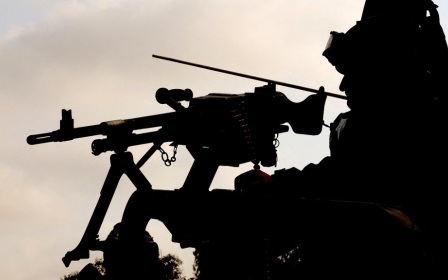Israel attacked aid workers despite knowing their locations, report says

Israeli forces have carried out at least eight attacks on aid convoys and premises in Gaza since October, despite aid groups providing their locations to Israeli authorities in advance, according to a new report.
Human Rights Watch said in a report on Tuesday that the eight Israeli attacks killed at least 15 people, including two children, and wounded at least 16 others.
They included attacks on World Central Kitchen, Doctors Without Borders (MSF), the UN agency for Palestinian refugees (Unrwa), Medical Aid for Palestinians (MAP), the International Rescue Committee and the American Near East Refugee Aid Organisation.
In an Israeli air strike on MAP and the International Rescue Committee on 18 January, UN investigators who visited the attack concluded it was likely carried out with a US-made munition with parts supplied by the UK. The strike wounded three people.
On 1 April, an Israeli attack on the World Central Kitchen convoy killed six international aid workers and their Palestinian driver, which Israel apologised for and described as a "mistake".
Stay informed with MEE's newsletters
Sign up to get the latest alerts, insights and analysis, starting with Turkey Unpacked
As with all of the eight attacks documented by Human Rights Watch, World Central Kitchen had provided Israeli authorities with GPS coordinates of its personnel in advance, but was still attacked.
"Israel's killing of seven World Central Kitchen aid workers was shocking and should never have happened under international law," said Belkis Wille of Human Rights Watch. "Israel's allies need to recognise that these attacks that have killed aid workers have happened over and over again, and they need to stop."
'Cannot rely on deconfliction'
According to the UN, 254 of its aid workers have been killed since the war on Gaza began on 7 October. At least 169 Unrwa facilities have been impacted by Israel's war in 368 separate incidents.
Workers from 11 humanitarian groups and agencies told Human Rights Watch that Israeli attacks have forced them to either suspend activities, reduce their staff or restrict their work in other ways.
"I can't risk sending more staff into Gaza because I cannot rely on deconfliction as a way of keeping them safe," a senior employee at one organisation attacked by Israeli forces said.

International law prohibits indiscriminate attacks targeting civilian objects, like aid convoys, that are expected to cause harm to civilians in a way disproportionate to any military advantage.
In the genocide case against Israel, the International Court of Justice in January issued a provisional ruling ordering the country to enable the entry of urgent humanitarian aid into Gaza.
But since the ruling, Israel has been found to be defying the order by directly bombing aid convoys and impeding aid deliveries through delays and denials of entry.
"On one hand, Israel is blocking access to critical lifesaving humanitarian provisions and on the other, attacking convoys that are delivering some of the small amount that they are allowing in," Wille said. "Israeli forces should immediately end their attacks on aid organizations, and there should be accountability for these crimes."
Israeli civilians have also blocked entry of aid into the enclave, bringing aid trucks to a standstill by holding sit-ins, laying down large rocks and even attacking vehicles directly.
This article is available in French on Middle East Eye French edition.
Middle East Eye delivers independent and unrivalled coverage and analysis of the Middle East, North Africa and beyond. To learn more about republishing this content and the associated fees, please fill out this form. More about MEE can be found here.




